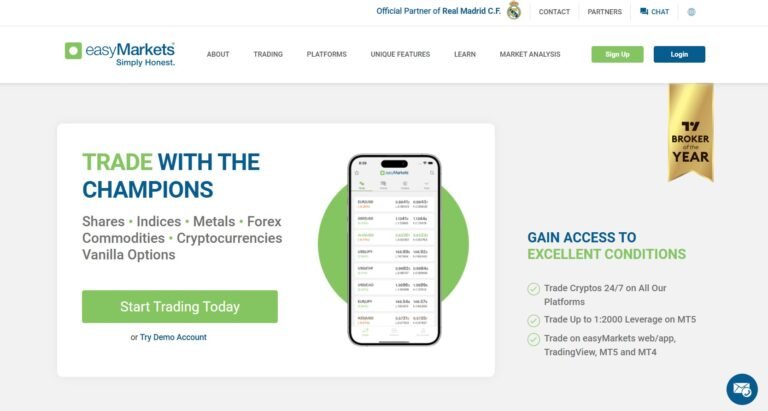Table of Contents
Introduction to Easy Markets
This Easy Markets review provides an in-depth look at the broker’s operations, regulation, and overall reputation. Easy Markets claims to offer forex, CFDs, and cryptocurrency trading to clients worldwide, with headquarters reportedly in Cyprus and additional offices in Australia and the Marshall Islands.
Despite these claims, there are growing concerns among traders who question: is Easy Markets a scam or a legitimate trading platform? For those who have been scammed or are hesitant before investing, this article aims to provide the clarity you need. This Easy Markets review uncovers all the warning signs you need to know.
Easy Markets: Regulation & Legal Status
Easy Markets operates under multiple entities, some of which are regulated by reputable authorities like the Cyprus Securities and Exchange Commission (CySEC) and the Australian Securities and Investments Commission (ASIC). However, it also operates through an offshore arm registered in the Marshall Islands—a jurisdiction known for its lax financial oversight.
This dual structure allows brokers to advertise strong regulatory credentials while funneling riskier clients through their offshore entity, where client protections are nearly non-existent. Traders dealing with the offshore arm may face no effective dispute resolution or compensation mechanisms in case of fraud. Learn how to spot a scam broker before it’s too late. This regulatory gap raises serious questions about whether Easy Markets is a scam.
Trading Conditions & Platform Analysis of Easy Markets
Easy Markets advertises multiple account types, starting with a minimum deposit as low as $25, and offers leverage up to 1:500 on its offshore accounts—well above what most top-tier regulators allow. While the broker provides access to MetaTrader 4 (MT4), WebTrader, and its proprietary platform, these features do not guarantee transparency or fair execution.
Furthermore, Easy Markets does not provide clear details about its liquidity providers or execution model (STP/ECN). Without transparency on trade handling, spreads, and slippage, traders are left exposed to potential conflicts of interest. Before committing funds, ensure you know what to check before signing up with a trading platform. These shortcomings make it difficult to dismiss concerns that Easy Markets might be a fraud.
Reputation & User Reviews About Easy Markets
Easy Markets has mixed reviews across various platforms. While some traders praise its beginner-friendly interface and fixed spreads, many report problems with delayed withdrawals, unresponsive customer service, and confusing bonus terms.
On TrustPilot, Easy Markets receives both glowing and highly critical reviews, with some feedback appearing potentially fabricated to counterbalance complaints. This inconsistency is typical of brokers facing reputational challenges, leaving prospective clients unsure of what to expect.
How to Test Whether Easy Markets Is a Scam
If you suspect Easy Markets may not be legitimate, take these steps before investing:
- Verify regulation: Check the CySEC and ASIC databases to confirm the licensing details of the entity you’re dealing with.
- Watch for red flags: Vague terms, hidden fees, and high-leverage offers are common warning signs.
- Check real reviews: Look for complaints on independent sites like Forex Peace Army or Scamwatch.
- Inspect the platform: Poorly designed tools or limited functionality can signal a low-quality broker.
- Review withdrawal policies: Delays, excessive verification, or crypto-only withdrawal options are red flags.
- Beware of guarantees: Promises of risk-free trading or guaranteed profits are classic scam tactics.
- Use a demo account: Test the platform without depositing funds to gauge performance and usability.
Final Verdict & Alternatives
While Easy Markets promotes itself as a regulated broker, its offshore operations, high-leverage offerings, and mixed user reviews make it a risky choice for many traders. The combination of multiple entities with varying regulatory standards creates uncertainty about which rules actually protect your funds.
If you value safety and transparency, consider using well-regulated brokers under strict authorities like the FCA, ASIC, or CySEC. These platforms provide greater accountability, clearer terms, and stronger investor protections.


